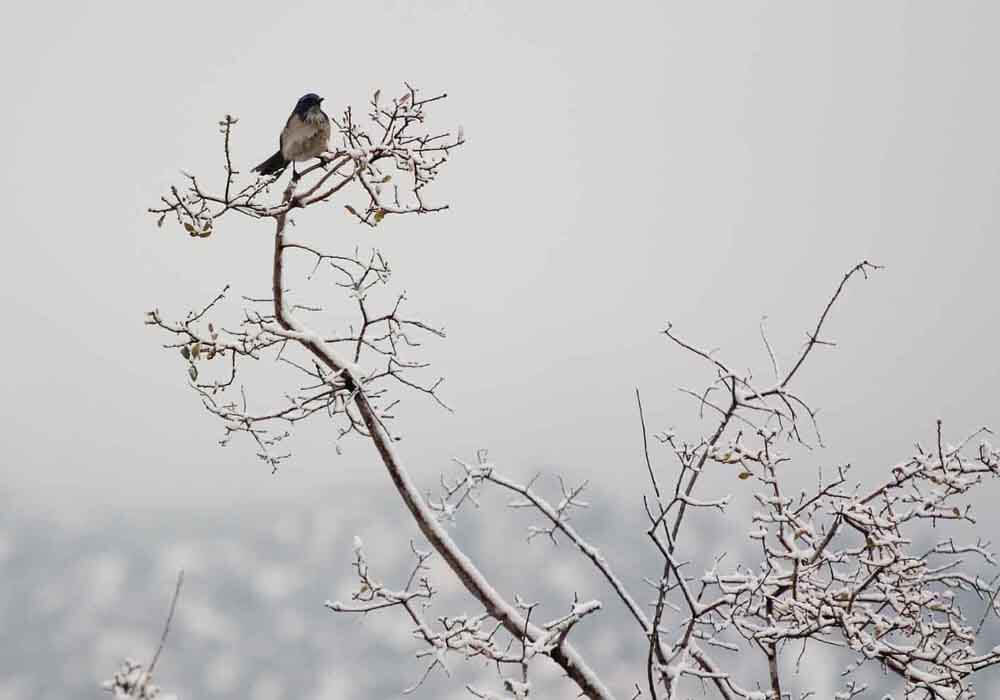What Do Birds Do In The Winter?
And How Do They Adapt To The Cold?
Winter is a challenging season for birds as they have to cope with the shorter days to find food and shelter, as well as avoid predators and keep warm. As such, it's only natural to wonder what do birds do in the winter to survive these conditions. Do they migrate south or stay put?
In winter, birds can go into torpor a hibernation-like state, fluff their feathers, change their sleeping habits, shiver, and preen to keep warm. Moreover, they store food and change their diets to get enough food for survival throughout the winter season.
In the rest of this article, I'll discuss what birds do to stay warm. I'll also talk about how they manage to get food now that natural food sources are scarce. Stay tuned!

What Birds Do To Survive the Cold Winter Season
The Winter season can get as cold as 0.7°C (33.26°F). Such cold temperatures can seriously threaten birds since they are covered in feathers, which do not provide much insulation.
Unlike humans, birds don't don jackets or scarves, neither do they hide in blankets to keep warm. So, what do birds do in the winter survive it?
The following are some things birds do to survive in winter:
Change Their Sleeping Habits
In summer, birds are known to sleep separately in trees or on high branches. However, this sleeping pattern is not ideal in winter since the birds will lose a lot of heat. Instead, they shift to sleeping habits that will conserve heat.
Some of these habits are:
Huddling
Huddling involves small bunches of birds wrapping themselves around each other to share body heat. Larger birds often huddle with smaller birds since they have a larger surface area.
According to the U.S. Fish and Wildlife Service, huddling is an excellent approach for birds to share heat.
Birds often huddle in places such as:
- Empty bird houses
- In a shrub
- Pine bush
- Protected branches
The key is always to remain as low as possible. Birds seem aware of the pressure and temperature relationship that the higher you go, the colder it becomes.
The birds will tuck their feet and heads to make the huddling even more effective. Some birds that like huddling are:
- Eastern bluebirds
- House wrens
- Sparrow
- Golden-crowned kinglets
Roosting
Birds will roost in large groups during winter to keep warm. This is because the more birds there are, the warmer it will be. The warmth generated by all the birds in one place is what keeps them alive during winter.
Birds roost on trees, power lines, and even on the ground. The key is to be close to other birds so that they can share heat.
Burrowing
Burrowing is common among Arctic birds. It involves the bird digging a hole in the ground and covering themselves with snow. The snow provides insulation against cold temperatures.
Some of the birds that burrow are:
- Snow buntings
- Ptarmigans
- Lapland longspurs
- Bunting
Learn Even More About Bird Survival In Winter
From This Informative YouTube Video...
Bird Torpor
Most animals and humans migrate to the South in winter. However, birds decide to go into torpor to conserve heat and energy.
According to the National Library of Medicine, torpor is a hibernation-like state that decreases the physiological activities of birds' bodies to conserve heat and energy.
Torpor decreases:
- Heart rate
- Respiration
- Metabolic rate
- Body temperature
Decreasing these body activities helps the bird to reduce heat loss.
Fluff Their Feathers
Birds will also fluff their feathers to create trapped air pockets. These air pockets will help to insulate the bird and keep them warm. The feathers will also block the wind, which can cause a significant loss of body heat.Preening
Preening is when a bird cleans, arranges, and lubricates its feathers using its bill. This process is essential for birds since it helps keep their feathers in good condition.
Preening also helps the bird to stay warm in winter. This is because when they preen, they can trap air in their feathers, which provides insulation against cold temperatures.
According to Science Direct, preening also helps the birds coat their feathers with waterproof preen oil. Thus, moisture from ice and rain can't penetrate the feathers.
Shiver
Birds can also generate heat by shivering. When they shiver, their muscles contract and generate heat.
It's worth noting that birds have a higher metabolic rate than human beings. Thus, they burn more energy to keep warm. As a result, they may shiver even more than humans.
The following are some of the birds that shiver to generate heat:
- Chickadees
- Titmice
- Nuthatches
- Woodpeckers
Eat More Food
Birds will also eat more food in winter to help them generate heat. The extra food helps to fuel their metabolism, which produces heat.
In addition to eating more food, birds will also store fat in their bodies. This fat acts as an insulator and helps to keep the bird warm.

During the winter how do birds keep their feet warm? There really isn't much fat on them to keep them warm...my article here explains the whole thing.
What Birds Do in Winter To Get Food
Winter is a season when food is scarce for our feathered friends. Most natural seed sources are depleted, and insects are not as active.
Here are some of the things birds do to get food in winter:
Store Food
Some birds are intelligent enough to know that winter is coming and prepare adequately for it. One form of preparation is storing enough food for the season while the weather is still warm.
The black-capped chickadee is one bird that stores enough food in different spots. The strange fact is that these birds can remember where they've stored food.
Another bird that stores enough food is the nuthatch. This bird will store its food by shoving it into cracks in trees.
A bird like the Ruffed Grouse can eat a lot of food in a few minutes. These birds have a large esophagus extension where they store food. The extension delivers food to the gizzard for digestion at a low rate to ensure the food is available for long.
Scavenge
Some birds will also scavenge for food in winter. They will look for anything edible, including leftover scraps from human beings.
Crows are known to be some of the best scavengers. These birds will even wait for human beings to finish their meals so they can clean up the scraps. As a caring human, you should not eat everything when you see these birds around. Leave some for them to enjoy while you're gone.
Other common scavenging birds are:
- Pigeons
- Starlings
- House Sparrows
- Seagulls
- Vultures
Changing Diet
Changing diet is a tactic used by birds to survive in winter. Energy needs for birds are higher in winter than in summer because they have to maintain their body temperature.
Some birds will change their diet to include more fats and high-energy foods like suet, which are essential for generating heat. Fats are a great source of energy and helps to insulate the bird's body.
How To Help Birds In Winter
Helping birds make it through winter is a kind way to give back to these creatures that brighten our days.
Here are some things you can do:
Make your yard bird-friendly. You can do this by planting native plants and avoiding pesticides.
- Provide a birdbath. Birds need water for drinking and bathing, even in winter. A heated birdbath is ideal, but you can also put out a shallow water dish and change it daily to prevent it from freezing.
- Put out some bird food. Make a suet feeder and fill it with suet cakes.

Want more ways to help birds in wintertime? My articles can help...
How To Attract Birds During Winter: Attract them to your feeder, birdhouse or heated birdbath.
Bird Baths Birds Will Use: Find here regular, and heated birdbaths
What Do Birds Do In The Winter...Conclusion
Like any other creature, birds are negatively affected by winter weather. Since they can't dress up for the winter, they do certain things, like changing their sleeping patterns to conserve energy. Moreover, they store more food to get them through the season.
You should be kind enough to help birds get through winter by sharing what you have with them.
Back To The TOP Of This What
Do Birds Do In The Winter Page

About the Author...
Richard Worden, a dedicated bird lover for over 20 years, I love to share my in-depth knowledge and passion for birds. Read more About Me and my expertise in this field.
- We Know Birds HOME ›
- Bird Behavior Facts and Information ›
- What Do Birds Do In The Winter?
